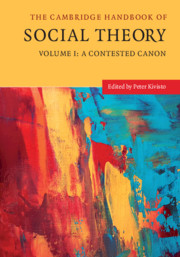Book contents
- The Cambridge Handbook of Social Theory
- The Cambridge Handbook of Social Theory
- Copyright page
- Contents
- Figures
- Tables
- Contributors
- Preface
- 1 The Emergence of Social Theory
- 2 “What Is a Classic?”
- 3 Karl Marx
- 4 The Marxist Legacy
- 5 Émile Durkheim: Theorist of Solidarity
- 6 What’s in a Name?
- 7 Max Weber
- 8 Weberian Social Theory
- 9 Georg Simmel and the Metropolitization of Social Life
- 10 Pounding on Parsons: How Criticism Undermined the Reputation of Sociology’s Incurable Theorist
- 11 Symbolic Interactionism
- 12 Erving Goffman and Dramaturgical Sociology
- 13 Structuralism
- 14 Norbert Elias, Civilising Processes, and Figurational (or Process) Sociology
- 15 Phenomenology and Social Theory
- 16 Pierre Bourdieu: An Intellectual Legacy
- 17 Developing Ethnomethodology: Garfinkel on the Constitutive Interactional Practices in Social Systems of Interaction
- 18 Jürgen Habermas
- 19 Anthony Giddens, Structuration Theory, and Radical Politics
- Index
- References
8 - Weberian Social Theory
Published online by Cambridge University Press: 03 December 2020
- The Cambridge Handbook of Social Theory
- The Cambridge Handbook of Social Theory
- Copyright page
- Contents
- Figures
- Tables
- Contributors
- Preface
- 1 The Emergence of Social Theory
- 2 “What Is a Classic?”
- 3 Karl Marx
- 4 The Marxist Legacy
- 5 Émile Durkheim: Theorist of Solidarity
- 6 What’s in a Name?
- 7 Max Weber
- 8 Weberian Social Theory
- 9 Georg Simmel and the Metropolitization of Social Life
- 10 Pounding on Parsons: How Criticism Undermined the Reputation of Sociology’s Incurable Theorist
- 11 Symbolic Interactionism
- 12 Erving Goffman and Dramaturgical Sociology
- 13 Structuralism
- 14 Norbert Elias, Civilising Processes, and Figurational (or Process) Sociology
- 15 Phenomenology and Social Theory
- 16 Pierre Bourdieu: An Intellectual Legacy
- 17 Developing Ethnomethodology: Garfinkel on the Constitutive Interactional Practices in Social Systems of Interaction
- 18 Jürgen Habermas
- 19 Anthony Giddens, Structuration Theory, and Radical Politics
- Index
- References
Summary
Max Weber’s influence on currents of thought over the past century has been profound and far-reaching. This chapter surveys four main areas of impact: the philosophy of the social sciences; class, economy, and rationalization; religion, culture, and social change; and power, politics, and the nation-state. A concluding section addresses the contemporary status of Weber’s thinking regarding the “rise of the West” and its place in world history.
Austin Harrington is Associate Professor of Sociology at the University of Leeds. His recent publications include German Cosmopolitan Social Thought and the Idea of the West: Voices from Weimar (Cambridge University Press, 2016) and Georg Simmel: Essays on Art and Aesthetics (University of Chicago Press, 2020).
- Type
- Chapter
- Information
- The Cambridge Handbook of Social Theory , pp. 145 - 160Publisher: Cambridge University PressPrint publication year: 2020

